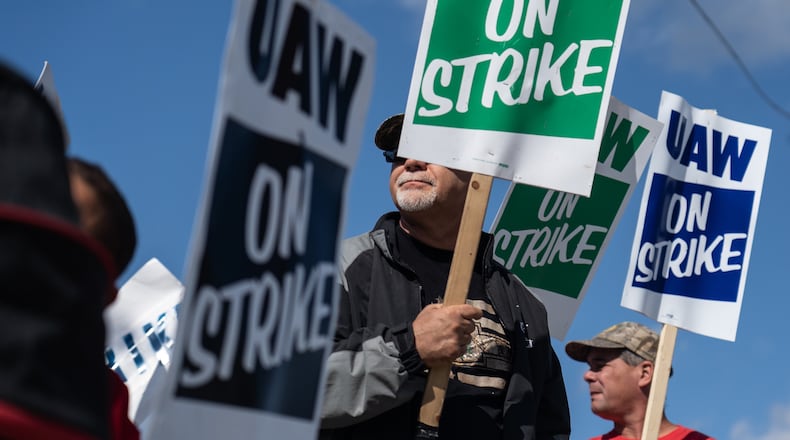“I don’t think we’ve seen an economic disruption like this in the last few years,” said Brian Peterson, director of public policy and analysis with the East Lansing, Mich,.-based Anderson Economic Group, which produced the report.
The strike continues to affect hundreds of DMAX and Navistar workers in Moraine and Springfield, respectively, as well as many auto dealers and body shops that are grappling with a shortage of inventory and parts.
According to Anderson, GM has shouldered $1.75 billion in operating losses for the strike.
And direct wage losses for all employees have reached $989 million.
“This is going to have a significant impact on the economy when the final numbers come in for the third and fourth quarter,” Peterson said.
That worker-impact number does not count strike pay for picketing workers who receive such pay, and it does not include part-time work that some workers may have picked up in recent days, once the UAW allowed picketers to take part-time jobs.
And the overall impact may be lessened somewhat by GM’s expected $485 million in potential settlement payments to UAW workers — if the proposed contract is ratified.
“At this point, we’re still concerned that this could result in a one-state recession in Michigan,” Peterson said, adding that the strike is being felt, and will continue to be felt in states like Ohio, Indiana and Wisconsin, states that have a large concentration of automakers and auto-parts suppliers.
Meanwhile, the strike continues. A UAW local bargaining unit of GM workers in Spring Hill, Tenn., near Nashville, rejected the tentative contract agreement by seven votes in a recent vote. Other, larger local units are voting and will continue to vote.
Nationwide, votes cast by more than 48,000 autoworkers will be totaled Friday, determining whether the proposed contract has passed — and whether the walkout will end.
“It’s very optimistic to think workers will go back to work on Monday,” Peterson said.
Even if the proposed pact is approved nationally, there still remains the prospect of restarting a “massive, massive supply chain within 48 hours,” he said.
“I think it would be optimistic to assume (work begins) even a week from now on,” he said Wednesday. “The supply chain has many, many tiers.”
While he expects the impact to be long lasting, he declined to speculate on whether it will have an impact on next year’s national general election.
Mike Gross, president of IUE-CWA Local 755, counts among his members more than 600 DMAX workers and about 15 General Engine Products workers who have been idled by the strike so far. His members make Duramax diesel engines that go into GM heavy-duty trucks.
They’re ready to get back to work, Gross said. His local has around 1,700 members total, including Tenneco workers, who have not been affected by the strike.
“These are always difficult situations when people are out of work,” Gross said. “But we understand it’s temporary.”
“Everybody is anxious to get back to work,” he added. “We’re all supporting the UAW members.”
Chris Blizard, president of UAW Local 402, has said it is unclear how long the voting process will take. His local unit represents workers at Navistar’s Springfield plant who are not participating in the strike. He could not be reached Wednesday.
Last week, Navistar shut down its main Springfield line as the company continues to deal with a shortage of parts caused by the strike. The plant has about 1,400 production workers represented by the UAW.
A message seeking comment was left with a spokesman for GM.
About the Author

